#Realm of Chaos Slaves to Darkness
Explore tagged Tumblr posts
Text
Bolt Thrower - Eternal War
#Bolt Thrower#Realm of Chaos (Slaves to Darkness)#Eternal War#Release date:#October 28th#1989#Full-length#Genre:#Death Metal#Themes:#War#Loss#Sacrifice#Brotherhood#Warhammer 40#000#UK
104 notes
·
View notes
Text
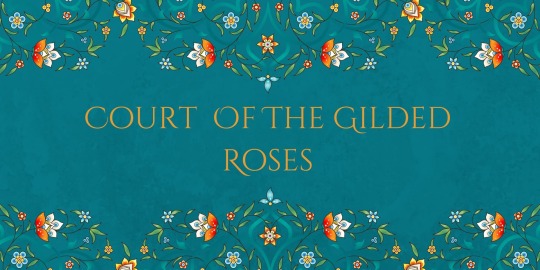
When you find yourself among the few women chosen to become a concubine in the Imperial harem, you have a chance to carve your place in court.
The life of a concubine might seem luxurious and idyllic, but behind the silken curtains of the harem, dangerous games are played. Games where the wrong words will cost your life, betrayal, lies and secrets are commonplace and gaining the shah’s attention is paramount to your survival.

Start out as a princess, disgraced noble or captive.
Intrigue, intrigue and more intrigue.
Dramatic events on par with a soap opera
Revenge, backstabbing, forbidden love, plots and more.
Rise the ranks by outsmarting or eliminating your rivals.
Produce and raise heirs to secure your place.
Influence politics through the emperor or seize power for yourself.
Learn fire magic or join a cult of chaos.
Live a life of leisure and the pursuit of higher education or a life of hedonism.
Inspired by the Sassanid dynasty and Persian mythology.

Shah Khazunef
He is calm, perspective and far less ruthless than his father before him but they share the same cunning nature and intimidating aura. Khazunef has deep brown skin, dark hazel eyes and silky mid length black hair that frames his face perfectly.
Fang
A former slave whose fighting prowess earned him freedom. He has since become a close friend of Khazunef and they regard each other as brothers. He serves as an informal advisor and spy to the shah but shirks any formal duties. Fang is charismatic and extroverted with copper red hair, rose skin and blue eyes.
Persa
Her name means dove and fits her gentle demeanor. She was raised a princess in a land of mountains and snow that was conquered by Shah Arzad. Upon the fall of her city and murder of her family, she was brought to the capital to serve in the palace. She has honey blonde hair, dark brown eyes and alabaster skin.
Ignasia
Ignasia is a fire priestess and staunch follower of the faith. Although born a noble, she gave up all claims and titles to serve in the fire temples as a guardian of the eternal flame. Ignasia has dark hair, darker eyes and a regal, reserved bearing.

Valide Zarayan
She is the ruthless and ambitious mother of Khazunef, originally a distrusted foreigner who rose to great power in the court of Shah Arzad. She rules over the harem like her own little kingdom and holds influence over her son.
Shahbanu Yaris
The wife of Khazunef and shahbanu of the realm. Yaris wed the emperor when he was 17 and she 26 in an alliance that strengthened the empire and influences it to this day.
Vizier Rubien
The grand vizier and advisor to the Emperor who Khazunef considers a father figure. Rubien is fiercely intelligent, loyal and wise. He remains dedicated to his work and helping the Emperor rule justly.
Averus
Averus is a high priest and soothsayer of the court. His advice is sought by all and a bad word about you from his lips can sully your reputation and relationships beyond repair.
Consort Iltani
Former consort and favorite of Shah Arzad. Her name is whispered like a curse, and her influence spreads far wide even though the valide has her currently imprisoned within the palace.

This story is for mature audiences, please proceed with discretion! Story will contain violence, drugs, alcohol, death, suicide, infanticide, harm to animals, miscarriages, abuse and sexual themes.
New Demo TBA.
#interactive fiction#if wip#cyoa#concubine#choice of games#hosted games#new wip#Cotgr#imperial harem#court of the gilded roses#genderlocked female#romance#intro post
654 notes
·
View notes
Text
Queer Fiction Free-for-All Book Bracket Tournament: Round 2A
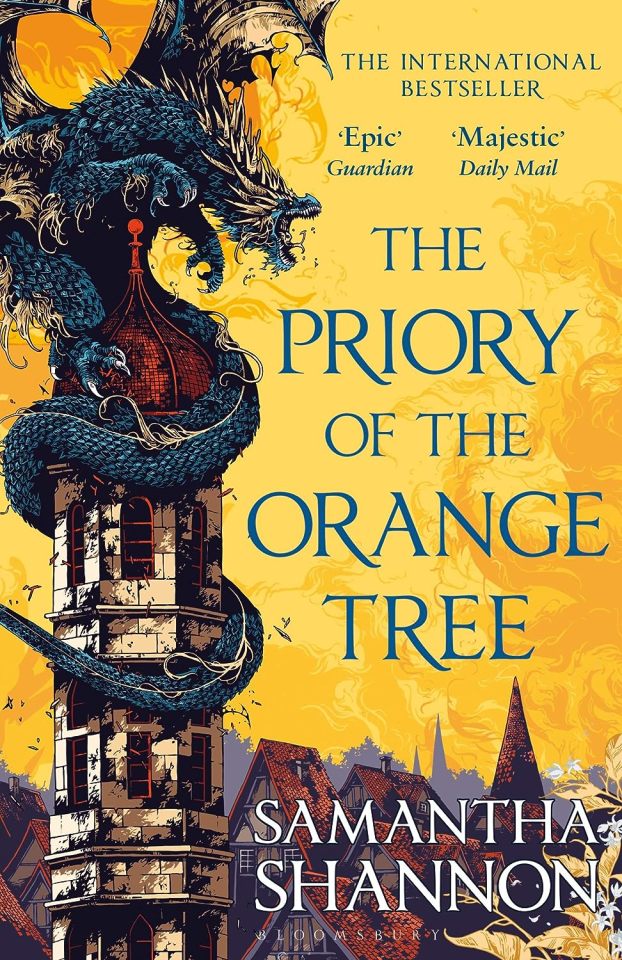

Book summaries below:
The Priory of the Orange Tree by Samantha Shannon
A world divided. A queendom without an heir. An ancient enemy awakens.
The House of Berethnet has ruled Inys for a thousand years. Still unwed, Queen Sabran the Ninth must conceive a daughter to protect her realm from destruction – but assassins are getting closer to her door.
Ead Duryan is an outsider at court. Though she has risen to the position of lady-in-waiting, she is loyal to a hidden society of mages. Ead keeps a watchful eye on Sabran, secretly protecting her with forbidden magic.
Across the dark sea, Tané has trained to be a dragonrider since she was a child, but is forced to make a choice that could see her life unravel.
Meanwhile, the divided East and West refuse to parley, and forces of chaos are rising from their sleep.
Fantasy, epic fantasy, secondary world, adult
The Deep by Rivers Solomon (with Daveed Diggs, William Hutson, and Jonathan Snipes)
Yetu holds the memories for her people—water-dwelling descendants of pregnant African slave women thrown overboard by slave owners—who live idyllic lives in the deep. Their past, too traumatic to be remembered regularly is forgotten by everyone, save one—the historian. This demanding role has been bestowed on Yetu.
Yetu remembers for everyone, and the memories, painful and wonderful, traumatic and terrible and miraculous, are destroying her. And so, she flees to the surface escaping the memories, the expectations, and the responsibilities—and discovers a world her people left behind long ago.
Yetu will learn more than she ever expected about her own past—and about the future of her people. If they are all to survive, they’ll need to reclaim the memories, reclaim their identity—and own who they really are.
Fantasy, Afrofuturism, folklore, novella, adult
#polls#queer fiction free for all#the priory of the orange tree#samantha shannon#the deep#rivers solomon#books#fiction#booklr#lgbtqia#tumblr polls#bookblr#book#lgbt books#queer books#poll#fiction books#book polls#queer lit#queer literature
71 notes
·
View notes
Text



“There is a saying in the Chaos wastelands of the realms - ‘the law of the blade is all’.”
•Excerpt from: Slaves to Darkness Battletome (3rd Edition)•
Warhammer Age of Sigmar Slaves to Darkness - Chaos Warband
#acrylic#figure painting#miniature#painting warhammer#warhammer#warhammer art#warhammer miniatures#miniature painting#age of sigmar#chaos warriors#archaon
24 notes
·
View notes
Text
The Eastern Winds
Just a drabble I imagined while working lol, although no romance, I guess... I made Agatha and Rio sisters along with three OCs 🫠
Agatha Harkness X Fem Reader
The Kingdom of Aether was divided into five distinct territories, each shaped by the ruling duke, giving every region its own unique rhythm. At its heart stood the palace, the core of the kingdom and Rio’s domain. To the west, the Household of Harkness thrived under Duke Agatha’s steadfast hand. In the south, Duke Sae of the Light Household shone with diplomacy and grace. To the north, Duke Xin of the Bloodstone Household held his ground, a place steeped in power and ferocity. Finally, the east flourished under Duke Phobei of the Dragon Household, whose lands were rich in nature and life.
The people, however, knew little of their rulers' true nature. They suspected their leaders were no mere mortals, as the royal family had remained unbroken for as long as anyone could remember. What they did not know was that these siblings were each a powerful entity capable of wielding unimaginable power. Rio, the eldest and most powerful, was Death. Sae, the gentlest figure of the royal family, embodied Life. Phobei, the Nature, often disappeared from the kingdom, drawn to the forests and creatures beyond. Agatha, the embodiment of Power, was especially close to Rio. Then there was Xin, the reckless general of the kingdom, who was, in truth, the force of War itself.
The narrow streets of the market buzzed with noise—vendors shouting over one another, the metallic clink of coins changing hands, and the occasional scream of livestock. The under streets, nestled between the western and northern districts, reeked of dirt and decay. Rain fell in fine sheets, turning the cobblestones slick with mud and grime. For most nobles, the prospect of braving such a place was unthinkable. Yet, Agatha Harkness, the Duke of the Harkness Household, strode through the throng with purpose, her features obscured beneath the deep hood of a heavy, dark cloak.
No one would expect a duke here. And that was precisely why she came.
She moved like a shadow through the chaos. The scent of stale ale, sweat, and desperation permeated the air as she passed traders hawking everything from spices to weapons. But it was not these mundane wares that drew her attention.
Agatha had heard whispers of a slave auction being held today. It was illegal—Rio, the sovereign of the realm, had outlawed slavery years ago—but in the cracks of society, things festered. For Agatha, it was not the buying of bodies that intrigued her but the why. Who dared to defy Rio’s decree? Who was so bold as to traffic flesh under her watch? Under Agatha's watch in her territory?
Her gloved fingers curled around her sword on her waistbelt as she entered the clearing where the auction was underway. A raised platform stood in the centre, surrounded by merchants and a crowd that buzzed with greed and disinterest alike. The slaves on display—men, women, children—were chained at the ankle, their gazes hollow. Agatha felt a faint prickle of rage but kept her expression carefully neutral.
Then she was brought forward.
The girl was small— Agatha but wasn't sure if that was because of her half-starved state or if the girl was actually shy of adulthood. Rain clung to her gaunt face and hair, plastering it to her cheeks. Her clothes were thin and torn, hanging like rags over a body that had clearly known hunger for too long. Yet, unlike the others, this girl glared—defiant even as the auctioneer roughly pulled her forward by the chain on her wrist.
“Lot 47! A rare one,” the man sneered. “Foreign stock, straight from the East—exotic and strong-willed.” He shoved her forward to show her off. The girl stumbled but didn’t fall. Her eyes scanned the crowd, sharp and angry, and for a moment, Agatha saw the faint flicker of something—survival, fury, life.
“Good for labour or otherwise,” the auctioneer continued, his words slick with implication.
The crowd murmured, bids beginning to rise. Agatha’s lip curled beneath her hood. These people were vultures, and the thought of this girl being sold to a life of abuse or toil sat bitter in her mouth.
“Five silver!” someone called.
“Ten!”
The auctioneer smirked. “Ah, now we’re getting somewhere.”
Agatha raised her voice firmly. “Twenty gold.”
The crowd fell silent. The auctioneer’s face froze. “I—Twenty gold? For this one?” He laughed nervously, as if unsure whether she was serious.
“Do you need me to repeat myself?” Agatha’s voice cut through the rain, low and commanding.
The man swallowed hard. “Sold. Twenty gold it is.” He moved quickly to finalise the transaction, unwilling to provoke further attention. The girl turned to look at Agatha, suspicion flickering across her features, but she said nothing as the chain was handed over.
Agatha pulled her sword from beneath her cloak. Before the girl could flinch, she sliced through the chain with a decisive movement. The links hit the ground with a dull clatter. “You are not a dog to be led,” Agatha said curtly.
The girl blinked up at her, still glaring, though there was confusion behind her eyes. “What do you want from me?” she demanded, her voice hoarse.
Agatha tilted her head, appraising her carefully. “What’s your name?”
The girl didn’t answer. Whether out of pride or mistrust, Agatha couldn’t tell.
“Fine,” the Duke murmured. “Then I’ll give you one. Doll. It suits you better than the number they’ve given you.”
The girl—Doll—stared at her as though trying to read her intentions. “Why?”
“Because you’re mine now,” Agatha said simply. “And I take care of what’s mine.”
There was no cruelty in her tone, only certainty. With a motion of her hand, she turned sharply on her heel, the folds of her cloak trailing behind her like dark wings. After a beat, Doll followed, her bare feet splashing against the rain-soaked earth. She didn’t trust this woman—how could she?—but something about her presence felt different. Powerful.
And power, Doll had learned long time ago, could change one’s fate.
The House of Harkness loomed like a dark citadel against the stormy sky. Spires of black stone clawed toward the heavens, their edges softened by the veil of mist that surrounded the estate. It was a house of power—ancient and unyielding, much like the woman who ruled it.
The massive front doors creaked open as Agatha strode in, her cloak dripping onto the marble floor. Doll followed close behind, her small figure shrinking slightly under the weight of the house’s grandeur. Servants bustled into the entrance hall, stopping mid-step as they caught sight of the girl trailing their Duke like a stray cat.
Gasps were stifled, whispers exchanged behind hands. The girl was filthy—her bare feet left muddy smudges on the pristine marble, her ragged clothing a stark contrast to the opulence surrounding her.
“Your Grace…” The head housekeeper, a stern woman named Mirren, stepped forward, her expression polite but strained. “We did not expect you to return with—” Her gaze flicked to Doll , then back to Agatha. “Company.”
Agatha shrugged off her cloak and handed it to a footman without looking up. “This is Doll ,” she said, her tone brooking no room for question or commentary. “She will be staying here, under my care.”
The staff exchanged uncertain glances. Mirren cleared her throat. “My lady, if I may—”
“You may not.” Agatha’s voice, though calm, cut through the air like a blade. “Draw her a bath, and make it hot. Burn whatever she’s wearing and find her proper clothing. Not scraps—something warm and decent.”
Mirren blinked, quickly lowering her head. “As you command, Your Grace.”
“Feed her,” Agatha continued, her gaze lingering briefly on Doll . “She looks half-starved.” Then, without another word, she turned and swept toward the staircase that led to her study, leaving a stunned silence in her wake.
The staff hesitated, uncertain of what to do with the girl. Doll glared at them all, her posture bristling with defiance. She didn’t need to understand the whispers or the looks to know what they thought of her: filthy. Useless. Out of place.
“Come along, girl,” Mirren finally said, her voice softer now but still clipped. “Let’s get you cleaned up before Her Grace changes her mind.”
Doll said nothing. She was used to orders, used to being moved like a piece of unwanted cargo. But something about this felt different. The woman in the cloak—Agatha Harkness—hadn’t looked at her like she was nothing. And even though Doll didn’t trust that feeling, she couldn’t ignore it either.
The servants ushered her down the halls of the mansion, the soft glow of lanterns illuminating dark wooden panels and arts with various styles—from various countries, she guessed. The house smelled something faintly floral, though she couldn’t name the flower.
By the time they brought her to a bathing chamber, Doll’s fingers had started to tremble from the lingering cold.
Mirren gave instructions to the maids, who filled a large copper tub with steaming water. “You’ll scrub yourself clean,” she said, eyeing Doll critically. “And if you can’t manage that, we’ll do it for you.”
Doll scowled but said nothing, waiting until the maids stepped back before she approached the bath. She dipped her hand into the water first, half expecting it to burn her—things this nice weren’t meant for people like her. But the heat was soothing, and as she sank into the tub, the grime of years began to melt away.
The maids left her clothes folded neatly outside the door: a simple but well-made dress of dark wool and clean undergarments. Doll scrubbed herself until her skin was raw, her hair—now free of mud—revealing its natural colour. When she finally emerged, dressed and clean, she hardly recognised herself in the polished silver mirror hanging on the wall.
A maid appeared at the door, carrying a tray of food: fresh bread, a steaming bowl of stew, and a cup of milk. Doll’s stomach twisted painfully at the smell, but she hesitated, eyeing the maid warily.
“It’s not poisoned,” the maid said softly, as though she could read Doll’s thoughts. “Her Grace ordered it for you herself.”
Doll stiffened. Her Grace. Agatha Harkness.
She ate quickly, her hands unsteady as she tore through the bread and spooned the stew into her mouth. It tasted like nothing she’d ever had before—rich and warm, settling in her empty stomach like an anchor.
When the food was gone, the servants escorted her to a small chamber near the kitchens—a far cry from the grandeur of the upper floors but still leagues above anything she’d ever known. The bed was soft, layered with furs and blankets. Doll sat at its edge, hands curling into the fabric as though afraid it might vanish.
Meanwhile, above her, Agatha sat in her study, a single candle illuminating the parchment on her desk. She sipped at a glass of wine, her thoughts lingering on the girl she had brought home.
Doll.
There was something about her—something sharp and unbroken, despite the life that had tried to crush her. Agatha had seen plenty of people in her years, but this girl was different.
And Agatha had a feeling she hadn’t yet seen the full extent of what Doll could become under her care.
Days passed in a strange quiet, an absence that settled like a shadow in the Harkness Household. The staff bustled about, performing their duties with their usual efficiency, but whispers swirled wherever the girl—Doll—appeared. She spoke to no one, answering the occasional question only with glares or narrowed eyes. It wasn’t fear that silenced her; no, Agatha could see it clearly. It was rebellion.
And Agatha found it amusing.
Sitting in her study one morning, she swirled the wine in her glass, her lips curling into the faintest of smirks as Mirren recounted the day’s news.
“She still refuses to speak, Your Grace,” Mirren reported, sounding exasperated but polite. “Won’t answer questions, won’t even acknowledge anyone. She just looks at us, like—like she’s daring us to say something.”
Agatha chuckled softly under her breath. “Oh, she is daring you, Mirren.” She tilted her head, her gaze glinting with interest. “And that’s what makes it so delightful. A silent rebellion, subtle and sharp as a blade. She doesn’t see herself as conquered, does she?”
Mirren looked uncertain. “No, Your Grace. If anything, she looks angrier by the day.”
“Good,” Agatha murmured, setting her wine aside and rising gracefully from her chair. “Let her have her little rebellion. Let her scowl and pout and glare all she likes. I think it suits her.” She reached for her cloak, which had been laid across a chair. “I’ll be out for the day.”
“Out, Your Grace?” Mirren blinked, frowning slightly. “Might I ask where you’re headed?”
Agatha flicked a glance at the housekeeper as she fastened the cloak at her neck. “To the palace. Rio summoned me earlier this week, and I find myself in a mood to humour our sovereign today.”
Mirren dipped her head respectfully. “Of course, Your Grace. Shall I prepare anything for your return?”
Agatha waved her off, already striding toward the door. “No need. I won’t be long.”
As she passed through the halls of the mansion, her sharp gaze caught sight of Doll, sitting by the window in the far corner of the parlour. The girl was perched awkwardly on the edge of the chair, dressed in the clean woolen gown the staff had given her. She had refused to stay still for fittings, so the garment hung a little loosely on her slender frame. Her hair, now clean and tied back, framed her face as she stared out at the courtyard with a frown carved deep into her brow.
Pausing for the briefest moment, Agatha turned her head just enough to look at her. “I’m going to the palace,” she said, the words conversational but pointed. “Try not to burn the house down while I’m away.”
Doll’s eyes snapped toward her at that, her frown deepening. Her lips pressed into a thin, hard line, as if she wanted to argue but refused to give Agatha the satisfaction.
Agatha allowed herself the faintest smirk. Oh, she’s furious.
Amused, she turned sharply on her heel and continued toward the door. She didn’t linger or look back, but she could feel the weight of Doll’s glare like a tangible thing on her back.
Outside, the Harkness carriage waited, the horses restless as the driver prepared to depart. Agatha stepped into the carriage without hesitation, her cloak flaring behind her like raven wings.
Inside the mansion, Doll watched her leave, her fists curling into the fabric of her dress.
She didn’t know why it annoyed her so much to see the woman—Agatha—come and go so freely, so confidently, like she owned the world and everyone in it. Doll didn’t understand this place or the strange woman who had brought her here, but one thing was clear: Agatha Harkness enjoyed her silence far too much. And Doll wasn’t sure whether she hated her for it… or something else entirely.
The chamber within the palace was warm, quiet, and cloaked in the soft golden glow of late afternoon. Two figures sat opposite one another at an ornate marble table, the surface adorned with an intricately carved chessboard. Rio, the sovereign of the Kingdom of Aether, lounged lazily in her chair, elbow perched on the armrest, chin resting on her fist. Her presence—serene yet strong—seemed to bend the air itself. Across from her, Agatha sat equally composed, one brow arched, lips curled into a faint smile.
Between them, the chess pieces glided silently across the board, controlled by deft flicks of their wrists, the barest sparks of magic dancing between their fingers. No hands touched the pieces; no words accompanied their moves—only the occasional scrape of marble on marble as one piece claimed another.
Rio’s black king shifted forward a single square. She glanced at Agatha from under her lashes, dark eyes unreadable. “You’re playing recklessly today.”
Agatha smirked, leaning back in her chair and conjuring a glass of wine into her hand. “Perhaps I enjoy keeping you on your toes.” She raised the glass to her lips, pausing to savour the deep red of the liquid before taking a sip.
“Or perhaps,” Rio countered with the faintest hint of amusement, “you’re distracted.”
A moment of silence passed, and Agatha tilted her head, flicking her wrist lazily. Her white queen floated across the board, kicking out the black bishop with effortless grace.
“I went to the market earlier this week,” Agatha said finally, her voice soft but pointed as though she were commenting on the weather. “There are still slave black markets.”
Rio stilled. The pieces on the board paused mid-movement, her black knight hovering above its square. The sovereign’s gaze sharpened, dark and knowing. “Is that so?”
“Yes.” Agatha swirled her wine, the glass catching the soft light. “Brazen, really. I doubt they even try to hide it.”
Rio’s lips thinned into a straight line. “I outlawed slavery years ago.”
“And yet, there it was,” Agatha murmured. She set the wine glass down with a soft clink. “A crowd of vultures bidding on flesh in the open air. It’s not a question of whether they defy you, Rio. They do. Boldly.”
Rio leaned back in her chair, her fingers drumming once against the armrest. “Did you intervene?”
“I purchased one,” Agatha replied simply. “A girl—young, stubborn, angry. The rest weren’t so lucky.”
Rio arched a brow, watching her carefully. “That’s unlike you, Agatha. Since when did you take an interest in lost souls?”
“Don’t mistake me for sentimental.” Agatha’s smirk deepened, though her voice held an edge that betrayed something deeper beneath the surface. “It wasn’t kindness. I found her amusing.”
Rio’s gaze lingered, searching her. “And what will you do with this… amusement?”
Agatha leaned back, the tip of her finger flicking forward to push her white queen one square further. The piece glided effortlessly.
“Cultivate her,” she said, her tone as smooth as silk. “Or send her back if she's boring.”
The sovereign tilted her head, her expression giving nothing away. “Careful, Agatha. Amusements have a way of becoming… attachments.”
Agatha scoffed, though it was a quiet sound, betraying nothing. “You should know me better than that.”
“I do,” Rio replied, and though her voice remained light, there was a weight behind her words. “That’s why I’m saying it.”
The chessboard settled into silence once more, and Agatha’s lips curled upward as Rio’s black king moved again, her magic sharp. The two women leaned into the comfortable quiet of their game, yet the
The conversation lingered like a spectre.
The dining hall of the Harkness mansion was grand and sombre, the kind of room built to intimidate as much as to host. Its vaulted ceiling disappeared into shadows where candlelight couldn’t reach, and the long, polished table stretched far enough that one might consider shouting to be heard from end to end. But the servants had grown used to the strangeness of their duke and the house.
What they had not grown used to, however, was the girl.
Doll sat quietly at the table, her posture rigid, her eyes fixed on her plate as if determined to ignore the absurdity of her position. Dressed in a plain yet fine gown chosen from the shop the duke personally shopped, she didn’t look as out of place as she had days ago. But the servants still couldn’t reconcile it—the filthy girl from the market dining with Duke Agatha of the Harkness Household as though she were a guest. A noble. An equal.
Agatha, for her part, was utterly unbothered. She cut her roasted beef delicately, chewing with languid grace as her wineglass beside her. She carried on as though Doll had always been there, ignoring the nervous glances exchanged between Mirren and the other staff bustling around the edges of the hall.
It was Mirren who finally dared to break the uneasy quiet. “Your Grace, the city has been… lively today.”
Agatha arched a brow without looking up from her plate. “Is that so?”
Mirren nodded stiffly, her hands clasped tightly before her apron. “Word has spread that Her Majesty visited the market between the western and northern district border two days ago. The slave black market has been… eliminated.”
The sound of silverware pausing against porcelain broke the stillness.
Agatha hummed softly, her lips curving into the faintest smile. She leaned back in her chair, swirling her wine glass between gloved fingers, her gaze dancing with quiet amusement. “Did she, now? Well, isn’t that delightful news.”
The servants glanced nervously at one another. Doll, seated to Agatha’s right, lifted her head just slightly, her brow furrowing as if to focus on the words being spoken.
“It’s said she destroyed it completely,” Mirren continued, her voice carrying an odd mix of pride and apprehension. “The slavers were arrested—or worse—and every captive freed. The city’s been buzzing with it since.”
Agatha took a sip of her wine and then, casually, as though discussing the weather, remarked, “I suppose she was in a mood.” She glanced toward Doll, who now stared at her plate with a clenched jaw, silent as ever. “Wouldn’t you agree, Doll?”
The girl’s gaze flicked up to meet Agatha’s, sharp and unyielding, though she didn’t say a word.
The servants froze, caught between wanting to watch and pretending they were invisible. Mirren’s hands tightened, her discomfort clear, but she said nothing. This was what unsettled them most of all—Agatha’s interest in the girl. It was unconventional, borderline improper, and beyond their understanding.
Doll looked like she wanted to glare, to snap, to say something, but instead, she dropped her gaze back to her food, stubbornly refusing to engage.
Agatha chuckled softly, breaking the tension with that low, amused sound. “Still silent. You are quite the rebel, aren’t you?” she murmured, almost to herself. “I wonder, Doll, how long you plan to keep up this charming act.”
Doll’s fork scraped against her plate, her movements tight, but she didn’t respond.
Mirren, desperate to shift the conversation, cleared her throat. “Will you be visiting the palace soon, Your Grace, to commend Her Majesty for such decisive action?”
Agatha waved a hand dismissively. “Rio doesn’t need my praise. She knows what she’s done and will likely spend the next week pretending it was all perfectly casual.” Her lips twitched. “I’ll see her soon enough. For now, I think I’ll enjoy the quiet.”
Her words were simple, but as Agatha’s gaze flicked back to Doll, it was clear she wasn’t speaking only of the palace.
Dinner passed in strained silence after that, broken only by the soft clink of silverware and the sound of the servants moving around the room.
Doll said nothing the entire time, but when Agatha rose from the table, pausing briefly to look at her as she left, there was something unreadable in her expression. Amusement, curiosity, maybe even satisfaction.
As the doors closed behind her, the servants exhaled their collective breath.
Doll remained in her seat for a long moment, her hands clenched tightly in her lap as the soft echoes of Agatha’s footsteps faded away. She didn’t know what the duke wanted from her, or why she insisted on dragging her to this table every night like some honoured guest.
But she did know one thing: Agatha Harkness was watching her closely. And for reasons Doll couldn’t yet explain, that knowledge filled her with unease… and something else she couldn’t name.
The next day, from the second floor balcony of the mansion, Agatha watched in silence, her hands resting lightly on the ornate banister. Below, the grand hall was a bustle of quiet activity. Servants moved back and forth, polishing the carved bannisters, dusting furniture, and sweeping the floors with practised efficiency.
And in the middle of it all sat Doll.
She was perched awkwardly on the edge of one of the velvet chairs, her legs drawn up just enough that her heels barely touched the floor. Her feet fidgeted—barely noticeable, but Agatha caught the movement. A small, nervous rhythm, like she was struggling to decide whether to sit still or stand up and leave. It didn’t help that the servants paid her no mind, their gazes deliberately sliding past her as if she didn’t exist at all.
Agatha’s gaze narrowed, her lips curling faintly as she observed.
Ignoring her completely, she mused to herself. How predictable.
It wasn’t cruelty, not exactly; it was the result of uncertainty. Doll didn’t belong here—she wasn’t staff, nor was she nobility—and none of them knew how to address her. Better to pretend she was invisible than risk offence.
But Doll wasn’t invisible, not to Agatha.
After a moment, Agatha straightened, her cloak flaring softly as she descended the grand staircase. Her boots clicked faintly against the polished stone, drawing the faintest ripple of attention from the staff as they moved to clear her path.
Doll’s gaze snapped up as the sound approached. She stiffened instinctively, hands tightening on the arms of the chair as Agatha stopped directly in front of her. The servants, ever attentive to their mistress’s movements, slowed and stilled nearby, trying not to seem as though they were watching.
Agatha regarded her for a long moment, as if taking in every detail—her guarded posture, her eyes that flashed defiance despite her clear discomfort, and the way her feet fidgeted even now, betraying her restlessness.
Finally, Agatha tilted her head slightly, voice smooth as silk but edged with curiosity. “Can you read?”
Doll blinked, caught off guard by the question. She opened her mouth as if to answer, then seemed to think better of it, clamping her lips shut.
Agatha arched a brow, undeterred. “Perhaps you don’t understand me,” she continued, her tone turning faintly lilting, mocking. “It wouldn’t surprise me. The slave market referred to you as ‘foreign exotic.’” She paused meaningfully. “I assume that means you’re from far, perhaps the east.”
Doll’s jaw tightened, her fingers digging into the fabric of the chair’s armrest. She said nothing, but Agatha noted the subtle shift in her expression—the faint flare of anger in her eyes, the way her shoulders squared defensively.
“Interesting.” Agatha hummed, her smile sharpening ever so slightly. “You do understand me well, don’t you?”
Doll glared at her silently, her chin lifting just a fraction. It was all the answer Agatha needed.
“Well, that settles it.” Agatha clasped her hands together, turning slightly to glance at the nearest servants. “Bring a selection of books to the parlour. Something simple, nothing too precious. I have a lesson to teach.”
The servants blinked, hesitating for just a moment before scattering to obey.
Doll’s eyes widened slightly, and for the first time, she broke her silence, though it wasn’t with words. A soft, frustrated sound escaped her lips—a cross between a sigh and a huff—as she turned her glare fully on Agatha, as if demanding to know what game the duke was playing.
Agatha, ever composed, merely smiled down at her. “You’ve been left to sit idle long enough,” she said smoothly. “I don’t believe in wasting potential, Doll. If you can understand me, then you can learn. And if you can learn…” She trailed off, eyes glittering.
Doll stared up at her, a flicker of confusion and suspicion crossing her face. Her fidgeting had stopped, though, Agatha noted with quiet satisfaction.
“Come along,” Agatha said lightly, turning on her heel and beginning to walk toward the parlour without looking back. “Unless you’d prefer to sit there all day, being ignored like furniture.”
Agatha paused mid-step, turning slightly to glance back at Doll. The girl hadn’t moved. She remained seated in the velvet chair, her eyes fixed on the floor, her body stiff. The servants froze, their hands stilling on their tasks as tension thickened in the air.
Agatha arched a brow, her lips curving faintly with something that wasn’t quite irritation—more like expectation. “Did you not hear me, my Doll?” she asked, her tone calm but with an edge of authority.
Still, Doll didn’t move.
Agatha’s gloved fingers tapped once against her arm before she tried again, her voice dropping into something softer but no less commanding. “Stand up. We’ve wasted enough time.”
Silence stretched, heavy and uncomfortable. Then, Doll’s hands finally clenched at the chair’s arms, her knuckles whitening. She pushed herself to her feet in one swift, sharp motion, startling the servants nearest her.
Her voice rang out, raw and sharp like a blade cutting through the stillness. “My name is F/N! Not Doll.”
The words echoed through the vast hall, leaving a stunned hush in their wake.
Agatha blinked once, her expression perfectly still, but her gaze sharpened like flint. Doll—F/N—stood rigid, glaring at her with all the fury she’d clearly bottled up since arriving at the mansion. Her eyes burned with defiance, her chest heaving faintly as though the words had cost her more strength than she could admit.
“I’m not your Doll,” F/N continued, her voice trembling slightly though her glare remained steady. “Don’t call me that.”
For a long moment, Agatha simply stared at her, unblinking. Her expression was unreadable, and the servants looked between them with barely concealed dread. It wasn’t often that anyone—let alone someone like F/N—dared to challenge Agatha Harkness so openly.
Then, Agatha’s lips curled ever so slightly, her voice a low hum of amusement. “F/N, is it?”
F/N flinched as though hearing her name from Agatha’s mouth unsettled her more than she cared to admit. Her glare faltered just briefly, but she recovered quickly, squaring her shoulders as if to brace for whatever Agatha might say next.
Agatha tilted her head, her smile faint but sharp. “You have spirit,” she murmured, almost as though speaking to herself. “I suppose I shouldn’t be surprised.” She stepped closer, her heels clicking softly against the polished floor as she closed the distance between them. F/N didn’t back down, though her breath hitched audibly as Agatha stopped just before her.
Agatha studied her face in silence, taking in every detail of the defiance in F/N’s gaze, the tension in her posture, the stubborn line of her jaw. Finally, she spoke again, her tone quiet but no less commanding. “Very well, F/N. I’ll call you what you wish—for now.”
20 notes
·
View notes
Text
I like putting Cole through various scinareos
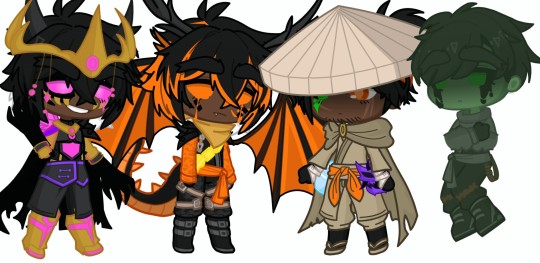
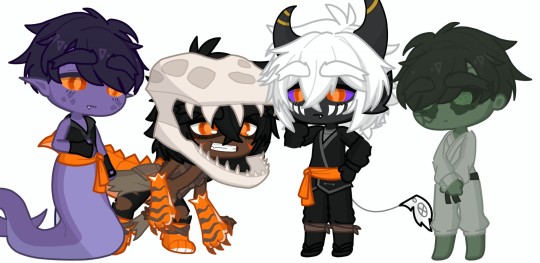
breif explaination bellow
⬇️⬇️⬇️
Crystal King - Overlord uses Cole as its vessel in Crystalized because Harumi has a sick sense of vengence. What better way to get back at the guy who nearly unknowingly ruined your whole plan by having him be a vessel to the embodiment of darkness, evil and chaos
Source Dragon - The Source Dragon of Strength chooses to live among humans by fusing its soul with a newborn baby. Cole is unaware of his true nature until Dragons Rising when Ras captures him and unleashes the Source Dragon within him
Traveller - Cole leaves the ninja after DoTD thinking they don't need him anymore (still hurt from being forgotten). He does his own vigilantie thing until SoG where he learns of the SoG's plan and steals the Mask of Hatred from both the SoG & the Ninja. To make sure no one will ever get their hands on it, he travels to the other realms with help from Mystake
My Nonexistant Friend - DoTD bad end, Yang returns to life, Cole is stuck at the temple forgotten by everyone. Until 300 years later where the current Master of Earth finds and befriends him. I have a fic written and completed, give it a read if you wish
Elemental Anacondrai - Chen is a bitch. Chen brands all the loosers of the Tournament of Elements as his slaves, meaning they also get snaked in the last few episodes of the season
First Realm - Cole is from the First Realm and lives among the dragons. The ninja meet him when they're stranded and he helps them out by taking them to Firstborne. He ends up in Ninjago in March of the Oni when the First Realm is destroyed so tbe ninja adopt the feral elemental master into the found family
Oni - Omega's a bitch. The Oni find Cole on deaths door after The Fall and turn him into an oni both to save his life and add him to their army. It doesn't work Cole just goes back to help the ninja, now a demon cat
Master & Student - Yang's a bitch. Yang wipes Cole's memory and treats him a like a student, all in a way to manipulate him and make him more willing to take on the temple's curse so Yang can be free. Yang is like a mix of both Mother Gothel & Pink Diamond
#ninjago#ninjago au#cole brookstone#ghost cole#oni cole#crystal king au#source dragon au#traveller au#oni cole au#my nonexistant friend#elemental anacondrai#dragon boi au#master & student
48 notes
·
View notes
Text
Bolt Thrower - Plague Bearer
#Bolt Thrower#Realm of Chaos (Slaves to Darkness)#Plague Bearer#Plague BearerRelease date:#October 28th#1989#Full-length#Genre:#Death Metal#Themes:#War#Loss#Sacrifice#Brotherhood#Warhammer 40#000#UK
43 notes
·
View notes
Text
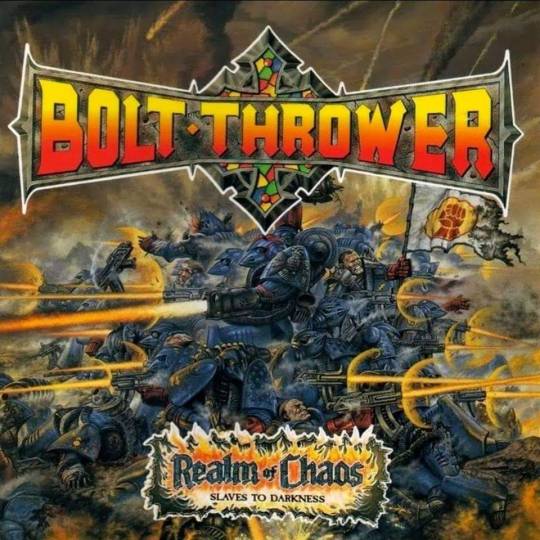
Bolt Thrower - Realm of Chaos: Slaves to Darkness. 28/10/1989
15 notes
·
View notes
Text
Bi-Han and Shang Tsung - sidenotes
I’m not done with my research for any bits of Bi-Han & Shang Tsung’s relationship through the years, as I’m pretty sure the lore & game mechanics have much more to offer about those two characters. However, as I'm not a player myself, finding proper sources will take much more time and energy than previously needed, so in meanwhile I'm sharing my random observations and notes about Sub-Zero and Shang Tsung.
POWER and FREEDOM
Some time ago I made a post about reputation vs reality of Shang Tsung and Bi-Han's life situations - how despite being praised for being cunning and strong, both either fulfilled high expectations of their masters or would be killed/harshly punished for failure.
Thinking more about that, alternative timeline’s Shang Tsung and Bi-Han/Noob share an additional trait - patience to bid their time. Mortal Kombat 11: Aftermath is the best proof of Shang Tsung’s dedication to seize the power and with it, freeing himself from the servitude (enslavement) he was stuck in for centuries. Bi-Han as Noob Saibot also had his own goal of ascending to power and with that, getting out of control of others:
Mortal Kombat 9's BIO:
"Noob Saibot's origins are unknown, but he is likely a revenant: a fallen warrior resurrected by the Netherrealm sorcerer Quan Chi to fulfill a dark objective. Noob has been assigned to aid Shao Kahn in his acquisition of Earthrealm. A faithful servant and a recent addition to the Brotherhood of Shadow, he will obey his master, Quan Chi, and complete his mission. But he is biding his time. Noob Saibot has a dark objective of his own.
Mortal Kombat 9's ENDING:
"Quan Chi should never have resurrected Noob Saibot. Nor should he have enhanced his power to defeat Shao Kahn. The revenant he created had broken free of his control. Noob had secretly formed an "understanding" with a cleric from the realm of Chaos and opened for him a portal to the Netherrealm. Shinnok, Quan Chi and the Brotherhood of Shadow were unprepared as the forces of Chaos overwhelmed them, leaving the Underworld severely weakened. Satisfied with his work, the cleric, Havik, returned to the realm of Chaos. Noob Saibot remained to seize control of the Netherrealm."
Mortal Kombat 11's BIO:
"Shadow of the Netherrealm. In life, Noob Saibot was known as Sub-Zero. Unjustly murdered by Scorpion, he was resurrected by Quan Chi and granted power over darkness, but as Quan Chi’s slave. Now, Quan Chi is dead. Noob Saibot is finally free to reclaim the honor that was stolen from him."
Mortal Kombat 11's ENDING:
"Kronika said I would lead the New Era's deadliest clan. But she made such promises to many. She could never keep them all. So I betrayed her, before she could betray me. When Kronika's sands fused with my shadows, my ambitions grew. Why be a ruler of mortals, when I could rule destiny itself? Mortals resisted, but could not stop, my blanketing history in cold, endless night. All is dark. All are shadows. I have had many names. Now I am become Death, destroyer of worlds."
Furthermore, MK1’s Bi-Han fits this scheme too (although he lacks the patience), as for him power and freedom are tightly tied to each other, as one can’t exist without the other. Personally I think this is a very neat detail when it comes to those two characters, as they seem to operate on a similar mindset.
Additionally, MK11 and MK1 Shang Tsungs share the same key word: INFLUENCE.


MK11!Noob had RECOGNITION while MK1!Bi-Han has POWER,


however the BIO itself imply that this version of Bi-Han too wants recognition for himself and his clan:
Under his leadership, the Lin Kuei will come out of the shadows and fight for its place as one of Earthrealm's great nations
which is pretty shame NRS pick “power” for Sub-Zero's key word.
SELLERS
MK1’s Shang Tsung is stated to be skilled seller (though why, I have no idea):
"Shang Tsung grew up in Outworld's backwaters. Too lazy for hard labor and too shifty for honest work, he eked out a living selling quack cures and fake magic. Though his wares were useless, Shang Tsung's easy charm always closed the deal. Shang Tsung was resigned to to this hardscrabble life. But then one day a mysterious stranger came, promising to make Shang Tsung a powerful sorcerer. Though suspicious of the offer, it was one he couldn't refuse."
The old card game presented Sub-Zero to be the best seller out of three ninja characters:
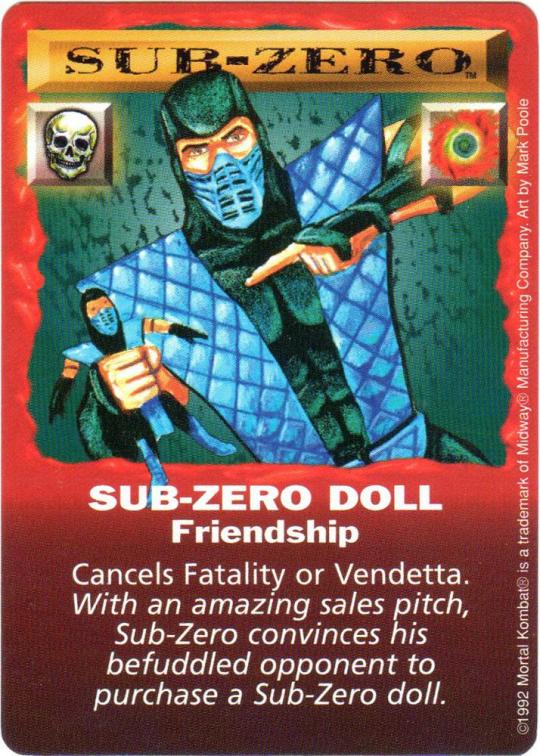
Friendship With an amazing sales pitch, Sub-Zero convinces his befuddled opponent to purchase a Sub-Zero doll.
For comparison, below is Reptile and Scorpion cards
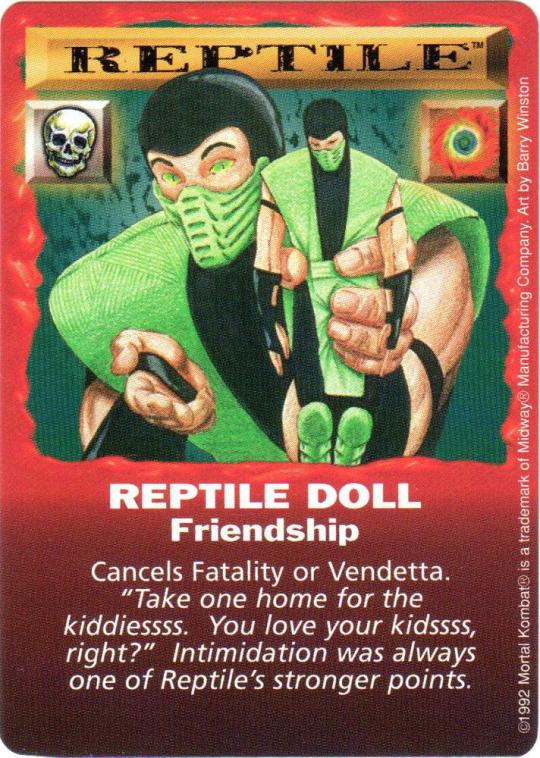
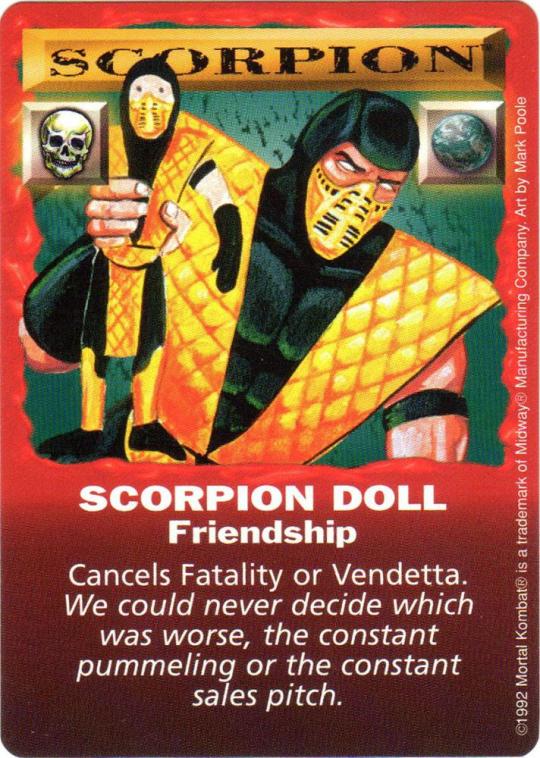
SIMILAR GEAR - sharp edged metal protection of fingers
MK11's Shang Tsung

MK11 Noob Saibot

Dark Sub-Zero (Order of Darkness)
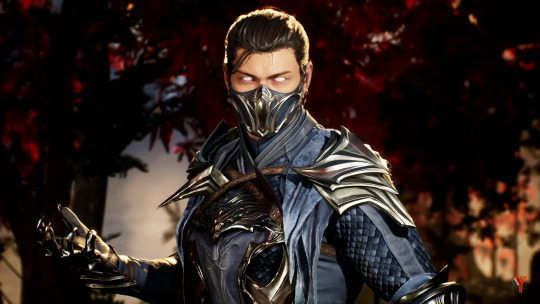
MK1: Khaos Reigns - Noob Saibot

MK: Onslaught (comics & game)


MK1's ANIMALITY in which Noob Saibot is alligator and Shang Tsung a cobra. Thus spiritual animals of both are reptilian. (In contrast, Bi-Han as Sub-Zero has a mammoth as his spiritual animal).
At the same there are some vital differences between Shang Tsung and Bi-Han.
For one, Shang Tsung is openly interested into technology. Magic is his main domain, but he does not look down on technology and may even adapt it for his own plans. Perhaps in the cloning process itself. We have various timelines' intro dialogues and MK11's Krypt to support his interest:
MK1
Shang Tsung: Once you are dead, I'll study that armor at my leisure. Sektor: What does a sorcerer know of engineering?
MK11
Shang Tsung: Perhaps technology is superior to magic. Terminator: Magic is an artificial construct. Shang Tsung: You’re not from around here, are you?
MK11 Krypt*
Shang Tsung: Sorcery isn't my only vocation. I'm also an inventor. While a modest endeavor, this forge is my finest. It can transmute collected items into new items you might find more useful
[* quote taken from MK wiki]
In previous timelines, Bi-Han did not utilize technology

[...] The Sub-Zero you saw killed was my older brother. He was stubborn in many ways. Refused to utilize modern technology on his missions.
but he was capable of using it (as seen with Noob Saibot and Cyber Smoke). In new era, Bi-Han will praise Sektor's technological genius
[...] but trafficking in such strong magic would surely draw Liu Kang’s attention. Sektor advised me that we avoid detection by building our army using science, not sorcery. We’ve invested much time in this endeavor, and we are beginning to see results. Once again proving the depths of Sektor’s genius.
and won't mind Lin Kuei using technology to gain additional advantage, yet he himself won't use any power suit (as was seen during Khaos Reigns).
The second difference is based on how Titan Shang Tsung and Dark Sub-Zero "solved" the problem of reincarnated characters. As in, Dark Sub-Zero made others part of his clan (Lin Kuei blood) while Titan Shang Tsung treats them as his minions.
And the last difference that catched my attention is how Dark Sub-Zero from Invasion would refuse to yield, even when given a chance to surrender

In contrast, Shang Tsung from Invasion Season #7, tried to run away once his invasion has failed and life was in danger

which makes me think Bi-Han, at least in the oldest timelines, is much more reconciled with death than Shang Tsung who will do anything to stay alive (begging to be spared, for example). Which makes sense, as Sub-Zero was an assassin so being killed was a much more probable outcome for him, than for Shang Tsung who could hire people to do his dirty job for him.
#mortal kombat#sub zero#bi han#noob saibot#shang tsung#i'm so down for the theme of power and freedom in regard for shang tsung and bi han#as none of them can be free without having power to back up the freedom#We could say that bi han and shang tsung are the caged animals#that has never forget the taste of freedom and will do everything to get it back#while at the same time bi han feels more willing to choose death than shang tsung?
13 notes
·
View notes
Text
Neopets/Skyrim Tarot: XIII. Death

One of these cards depict the embodiment of the Void, the concept of chaos given name and creed, the patron of the Dark Brotherhood who revels in the loss of life and claiming of souls.
The other depicts a guy whose land was ruined by another's greed who picked one war, lost it, and learned his lesson and now is far more benevolent towards others past his lands and had always been benevolent towards his own people. He just wants the best for his people.
This pair of cards is actually what made me want to do this series because the difference between the two characters depicted was just...so funny to me.

Lord Darigan is a Darigan Korbat and has long been in charge of the Darigan Citadel, even before King Skarl stole Darigan's orb and cast a plague across the Citadel's people. There were two Meridell-Citadel wars. In the first, Lord Darigan fell under the influence of the Three and got his ass beat, leaving an opening for General Kass to step up as the new Lord and pick the next fight and also fall under the sway of the Three only to also get his ass beat. Lord Darigan returned to stop Lord Kass, and now there is a tentative peace between the Darigan Citadel and Meridell (which is often fought in the Altador Cup more often than not nowadays).
Lord Darigan is an embodiment of Death as change, since the Darigan color was originally a curse that the Citadel has now made peace with. And with that peace, they are now finally moving forward again.

Sithis is the start of the house. Before him was nothing, but the foolish Altmer have names for and revere this nothing. That is because they are lazy slaves. Indeed, from the Sermons, 'stasis asks merely for itself, which is nothing.' Sithis sundered the nothing and mutated the parts, fashioning from them a myriad of possibilities. These ideas ebbed and flowed and faded away and this is how it should have been. One idea, however, became jealous and did not want to die; like the stasis, he wanted to last. This was the demon Anui-El, who made friends, and they called themselves the Aedra. They enslaved everything that Sithis had made and created realms of everlasting imperfection. Thus are the Aedra the false gods, that is, illusion. So Sithis begat Lorkhan and sent him to destroy the universe. Lorkhan! Unstable mutant! Lorkhan had found the Aedric weakness. While each rebel was, by their nature, immeasurable, they were, through jealousy and vanity, also separate from each other. They were also unwilling to go back to the nothing of before. So while they ruled their false dominions, Lorkhan filled the void with a myriad of new ideas. These ideas were legion. Soon it seemed that Lorkhan had a dominion of his own, with slaves and everlasting imperfections, and he seemed, for all the world, like an Aedra. Thus did he present himself as such to the demon Anui-El and the Eight Givers: as a friend. Go unto the Sharmat Dagoth Ur as a friend. AE HERMA MORA ALTADOON PADHOME LKHAN AE AI. -Sithis by Michael Kirkbride
Sithis embodies a more literal Death, yet despite that surface-level reading, he also embodies the changed aspect. Sithis is Padomay is Fadomai, the primordial force of change and opposite of Anu. Without Sithis there would be no Lorkhan, and without Lorkhan there would be no Nirn in most mythologies.
"Ha! To try to put a name on me is to try and hold chaos in your hand, mortal! If it helps you stay sane, think of me as a miniscule piece of Sithis ... a jot of intellect and will, contained within this shadowed form." —Aspect of Sithis
Considering the relative lack of Dark Brotherhood representation in this deck despite that faction being one of the most popular, it makes sense to have Sithis as Death. Even Lorkhan, the dead god whose heart gave Dagoth Ur and the Tribunal power, is best described as Sithis's "son" (though that word kind of lacks the punch that the lore has). Lorkhan would also be an excellent depiction for this card, but if we're going with the "one character per card except for on the Lovers" rules that the artist (Erika Hollice) seemed to be under, then Sithis is probably the best choice.
It's just also a really fucking funny choice when you put him next to Lord Darigan.
8 notes
·
View notes
Text
Chapter 1083: By Any Means Necessary
Color me shocked, but we’re actually following up from last chapter to learn the truth about Reverie!
But first, that cover.

On the surface, it makes me laugh a bit. But, upon further reflection--and I’m going to look way too deep for a cover request--this makes me think of the way Doffy took in children. He’d find these heavily damaged children like Law and Baby 5, he’d wrap them in his coat (give them a place in the Family, make them feel wanted and needed, make promises about the future) while offering only the barest care for their actual trauma, like the bandage here. (In fact, he was actually making the trauma worse.)
See? Way too deep for a cover request 😅
Anyway, on to the chapter:
So, the Revolutionaries had three main aims for infiltrating Mariejois:

I can only imagine that cutting off the Celestial Dragons’ food reserves is going to lead to some dark things. (I mean, even cannibalism hasn’t been off the table so far in One Piece, so...) While the Revolutionaries aimed to help as many slaves escape as they could, you know they didn’t get them all. And the ones left behind are really going to suffer from this.
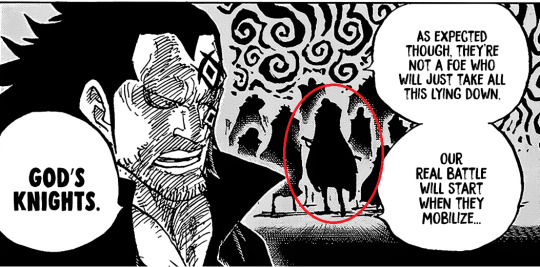
Excuse me, why does this silhouette of God’s Knights look like Shanks?
It’s probably a misdirect (we all know how the silhouettes of Kaido and Big Mom looked before we met the actual characters, after all) but considering the background for Shanks that we got from the Film Red material and the fact that the Five Elders were willing to meet with him... it doesn’t seem out of the realm of possibility. (Or maybe one of Shanks’s family members?)
Side note: on a shallow note, I really like this panel of Sabo:

Anywho, Dragon acknowledges that Cobra was actually a kind and benevolent ruler, but that doesn’t matter for the cause of the Revolutionaries. For the greater good is the type of attitude that leads to those who rebel against the corrupt to become the very thing they were fighting against once they are victorious.
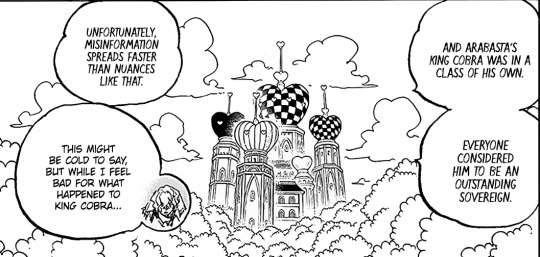
“Unfortunately, misinformation spreads faster than nuances like that” is such a true line.
And Sabo...

The boy is fine being seen as Cobra’s murderer because it’s potentially helpful to the cause. It’s nothing more than a cold calculation for him. It’s also such a contrast to Luffy, who focuses on the individual people he cares about and the things that matter to them rather than the bigger picture; for instance, liberating Dressrosa wasn’t about the importance of freeing the people who’d been living under Doflamingo; it was because Doflamingo hurt Law and Rebecca, people he cared about. Freeing Wano was for Momo and Tama and the others he’d come to care for (and because he wanted a good fight against Kaido, ha.)
It’s interesting; we think of Luffy as being so selfish that he’s practically selfless. He fights for selfish reasons but ends up doing selfless things like freeing countries as a result of his actions.
On the other hand, Sabo is, arguably, so selfless that he’s selfish. He doesn’t care about the consequences for him in all of this because it redounds to the Revolutionaries’ benefit, but at the same time, he’s willing to let others--like murder victim Cobra, for instance--suffer for the purposes of the mission. It’s selfish.
I can’t help but think of Makino’s reaction to seeing the newspaper:
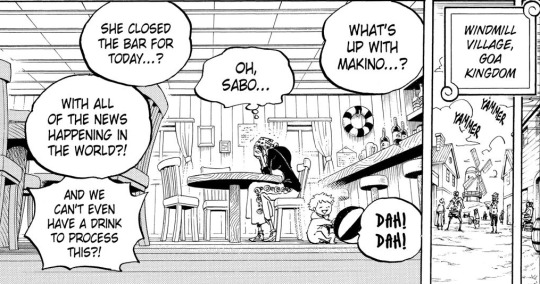
And now we know what she was looking at:
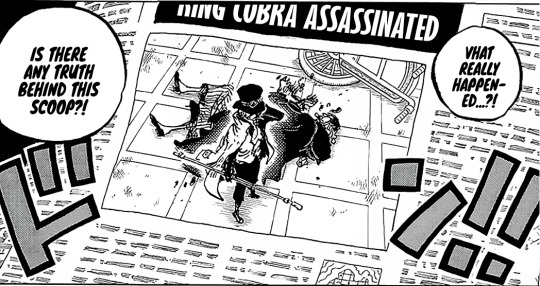
To be fair, this is a pretty damning picture (though Sabo easily could have just come across Cobra’s body when this picture was taken). And Sabo being willing to be seen in this light shows just ties into his selfless selfishness.
Moving on, we start a flashback to a month earlier in Mariejois. The Revolutionaries are attacking and causing enough chaos to bring down two admirals.
On a random note, Karasu’s Devil Fruit is just perfect for his aesthetic, and I love that for him.

It’s also very funny to me that Ryokugyu, who we saw as being incredibly bullheaded when he attacked Wano, is holding back to avoid causing damage in Mariejois...
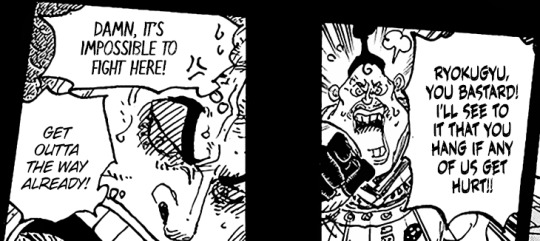
while Fujitora is pulling his best Ivan Drogo:
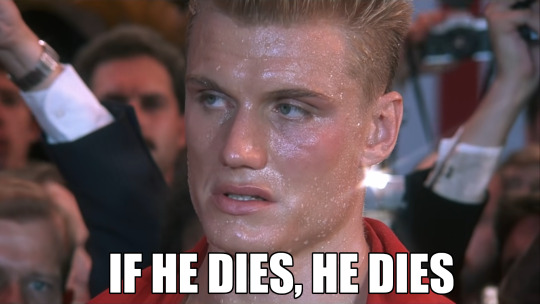

😂😂😂
I completely forgot Bonney snuck into Reverie. Whatever happened there is clearly tied into how she ends up in the water for the Straw Hats to find her.
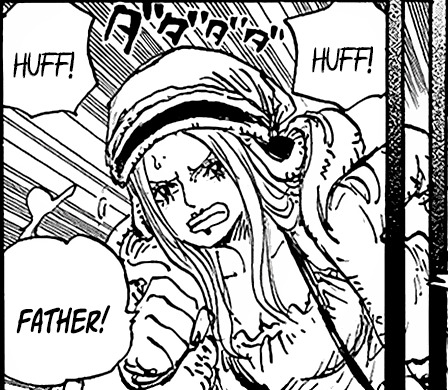
And my girl, Vivi. Fiery Vivi is the best Vivi. I love her a lot.

I’m interested in, between this flashback and Egghead, where Lucci’s character is going. It feels like he’s becoming disillusioned with the orders he’s been following; he’s a definite wild card.
It’s interesting that Cobra is going in to meet with the Elders without anyone with him--almost like he knows what’s likely to come of this meeting and doesn’t want to drag anyone into it.
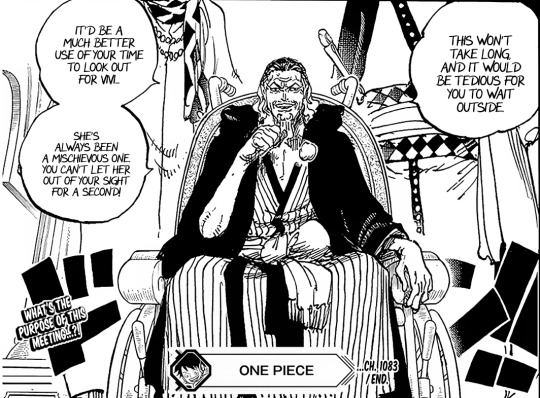
I’m looking forward to seeing how we get from this to Vivi and Wapol, of all people, hiding out with Morgans.
With all these revelations, we really are in the final saga, aren’t we?
#One Piece 1083#One Piece chapter 1083#One Piece spoilers#One Piece 1083 spoilers#Donquixote Doflamingo#Sabo#Monkey D. Dragon#Ryokugyu#Fujitora#Jewelry Bonney#Nefertari Vivi#Nefertari Cobra#Rob Lucci#One Piece#Chapter write-up
124 notes
·
View notes
Text
Tru-isil Empire
The Tru-isil Empire, a formidable power in the Arkera, stands as a nation shrouded in self-imposed isolation. Nestled in the northern reaches of the continent Luminaria, the empire boasts vast territories, yet it actively governs only a portion, leaving vast expanses wild and untamed. Despite this, the Tru-isil Empire thrives, feeding its large population through a blend of ancient sciences, sorcery, and technologies—a legacy of the Old World that they have mastered and preserved.
This empire is the successor to the once-mighty Lym-shara Empire, which rose from the ashes of the fallen Goz shortly after the cataclysmic Judgement. A cabal of prescient sorcerers, foreseeing the end of the Old World, had prepared for the aftermath, laying the groundwork for an empire that would span the globe. The Lym-shara Empire reigned supreme for centuries, but as the world recovered and new powers emerged, it succumbed to internal corruption, overexpansion, and decadence, giving rise to the more sustainable Tru-isil Empire.
The transition to the Tru-isil Empire did not herald a moral renaissance; the same ruthless noble houses continued to rule, with House Ero-Hurun at the forefront, having overthrown and reshaped the Lym-shara Empire. Today, the Tru-isil Empire remains aloof from foreign entanglements, save for a few trade outposts, preferring subtler means to exert its influence abroad.
Within its borders, the Tru-isil Empire is a cauldron of ancient and powerful households, each vying for control, influence, and wealth. The emperor, ever watchful, knows that loyalty is a foreign concept in this empire; only through fear, strength, and cunning can one maintain power. The opulent and decadent courts of the Tru-isil Empire are a treacherous landscape, where political machinations and intrigue are deadlier than any battlefield.
The noble families, with few exceptions, are notorious for their histories of atrocities and sins. Each is compelled to offer tribute to the emperor to keep the delicate balance of power intact. Despite this, strife and warfare are not uncommon, often incited by the emperor himself to keep potential rivals divided.
The Tru-isil Empire is a land of dark marvels and sinister pleasures, reminiscent of the Old World's most decadent days. Forbidden magics like scuramancy and morphomancy, along with other proscribed technologies, are the pillars of the empire's prosperity. The food they consume and the materials for their beasts of burden are all products of their arcane expertise.
The Isilnyr, descendants of the people of Goz, form the majority of the empire's populace, towering above the indigenous cultures and the vast slave population drawn from across the world. To the Isilnyr, all others are considered lesser beings.
Unfettered by external powers, the Tru-isil Empire is the only nation free from the influence of the Sharoo Magyar Alligium. Its economy is robustly independent, and the empire is self-sufficient, meeting the basic needs of its people. Yet, their insatiable desire for the finest luxuries has led to a pragmatic relationship with the Alligium, allowing Isilnyr merchants to trade their exotic technologies and sciences across Arkera with relative freedom.
Two major religions divide the empire's populace along social lines. The Tzuran faith, embraced by the elite, preaches that humanity is the plaything of a bored deity, destined to repeat life endlessly for divine amusement, with salvation lying in breaking free from this cycle. In contrast, the more prevalent Unandor faith espouses that humanity is inherently unfit for the universe, with salvation attainable only through the teachings of seven chaos gods who ascended to higher states of being.
Traveling to the Tru-isil Empire is a journey into a realm of sin and splendor, offering a glimpse into the nature of humankind as reflected in the Old World. Despite the empire's dark reputation, its common folk share the same loves, hopes, and struggles as those found across Arkera, enduring under the yoke of their malevolent rulers.
#conworld#worldbuilding#low fantasy#world building#arkera#creative writing#dark fantasy#fantasy world
10 notes
·
View notes
Text
Vampire Spawn Lore/Headcanons Help?
Hey friends and strangers, Long Post here.
I have noticed in my attempts at research that there is almost nothing but a stat block for Vampire Spawns. But we do know lots about Vampires themselves.
I'm going to break this down into things that are consistent in BG3 and a couple things I noted in other RPGs that could be relevant?
Please feel free to comment with things you believe are true or could be true, or things you know from actual Vampire/Vampire Spawn lore! It'll be fun to see what people in the community do, think, and use for story writing and such!!
(Also, please note that I wrote this between playing BG3, Deep cleaning my apartment, and ADHD kicking my ass, so apologies if it's a little scattered.)
What we do know, per Forgotten Realms Lore:
Spawn share their masters' weaknesses, to a lesser degree (can't enter private dwellings without permission, running water is acid damage, can't see themselves in mirrors, sunlight burns, garlic, etc)
They also can share their masters' strengths: Spawn are said to be able to turn into mist and climb on walls like a spider. They also seem to be able to charm & "Like most undead, their bite and touch caused blood drain and domination" (Aka. the spell Dominate Person)
Spawn do regenerate health, but the damage they take from running water & sunlight is higher than their regeneration, which is why they can die to these things.
Their features become more distorted/sharp/predatory when infected.
As Astarion mentioned, Spawn are less slaves and more puppets designed to do their master's bidding. Free will is non-existent, even if they're fully aware of what they're doing. Obviously it would depend on how controlling the individual Vampire is, but when given an order they cannot disobey.
Once a Spawn is freed, they can no longer be enslaved (by another Vampire. So, one master and if said master dies then the spawn is free to go on their merry way without fear.)
"When it came to a life of adventuring, vampire spawn would seek vengeance on their creators, or penance for their new damnation. If these monsters could overcome their ravenous emotions, they might seek out knowledge, glory, or power. Pride was the true driver of the vampire spawn, since they believed themselves better than others."
A point of contention: Yes a Spawn can feed from their master to become a True Vampire, but the Spawn needs permission to do so. It's a consent thing. So, yes, while it would be nice to bully Cazador into turning Astarion with a series of fun intimidation checks, that man would rather die than concede.
Besides, per the Lore True Vampires lose their humanity in the process of the change and all of their emotions twist into dark shadows of themselves. Love becomes possessiveness, etc.
Stakes do not kill Vampires, they paralyze them. Thus making it easier to kill them. Astarion's preferred death of decapitation is - from what I've seen - one of the most widely supported ways to permanently kill a Vampire in not just FR Lore, but IRL too.
Some other things that I thought were interesting: (Admittedly this could be partially due to the tadpole)
Despite the inherent nature of Vampire Spawn, Astarion doesn't seem to be evil - in fact, the more we learn about him, the kinder he seems and the more the evil act seems to be for protection. He's definitely firmly self-serving and Chaotic, and will forever be a mischievous chaos gremlin who talks shit and plays mean-spirited pranks on people for sure, but he is kind.
Astarion seems to be able to imbibe in at least drink if not food as well. He's shown drink wine at several points throughout the story.
He sweats and bleeds and salivates, indicating he does have bodily function to some degree. (I'll touch on this a bit later.)
If his features are distorted/more predatory HOW SOFT MUST HE HAVE LOOKED BEFORE WHAT THE FUCK?
ALL OF CAZADOR'S SPAWN HAVE SOULS. This is Weird for Vampires/Undead.
Notes from other (Non-FR) Lore sources:
Midgard (D&D 5e supplement from Kobold Press):
Vampire Spawn are able to have children and sometimes those children are Dhampir/Dhampyr (do with this what you will)
Honestly this system has a ton of cool lore, but that is the only different Spawn-specific thing I found by skimming. But if you want lots of Vampire/Dhampir/cool character backgrounds related to those things? Please take a look. Not associated, just found it while researching and Thought It Was Neat.
General/IRL Vampire Lore:
Originally Vampires couldn't see themselves in mirrors because they were backed with a thin layer of silver - a very pure metal said to repel vampires and werewolves. So theoretically a Vampire in the today times would be able to be seen in a mirror, as ours have aluminum backings. So you could, potentially, with a bit of work, find an exotic mirror that might work for Astarion and the horde of other Spawn you may or may not have released into the Underdark.
Running water has the same implications in that it's pure, which is why a Vampire can't touch/cross it.
Sunlight as a Vampire weakness only came about during the film Nosferatu where it then became public lexicon - prior to that, Vampires were more active at night, but not inactive during the day.
I read somewhere - probably on this hellsite - that a Vampire's fangs are technically their reproductive organs, and I hate it. Please make this joke more in fanfics.
Vampire, The Masquerade (which is now not the most up-to-date World of Darkness lore, but more widely known):
"Vampire bodies do not function like the bodies of living organisms. They are (more or less) preserved in a life-like state, but they do not age or die from illness." - pretty standard among all Vampire lore
"Vampires are also vulnerable to so-called "True Faith", that is, the strength of a person's true religious conviction (which is, fortunately for vampires, very rare). Such faith need not be religious per se — one of the rulebooks mentions a yuppie repelling a vampire with his credit card, thanks to his faith in the power of money." - lmao please this is so funny, please imagine some rich idiot in somewhere in Toril pulling a 'The power of Christ compels you!' with a sack of gold pieces. Let's be honest, it's probably some rich merchant from Amn.
"Vampires are immune to most diseases, drugs and poisons, but can be affected by some if present in the blood of their victims." - cheap and easy way to save money on wine
"Normally, a vampire looks the part of a corpse. They're pale and register no pulse. They exist at slightly below room temperature. Food and drink taste terrible, and immediately cause violent, bloody vomiting. They also cannot function sexually, or convincingly fake enjoying sex."
The Blush of Life skill! "By spending a point of Vitae, Kindred may invoke the blush of life for a scene. This makes them functionally human. They become warm to the touch, with a full, hearty pulse. They produce natural bodily fluids. They function sexually in the way a human can, becoming physically aroused, erect, and lubricated. They can keep food and drink down, ejecting it later in the night. They’ll pass medical inspection while the blush remains active."
I can't remember where this came from:
I remember reading somewhere that Vampires probably need to feed in order to continue to have regeneration properties. So they have blood/fluids but they need to feed to be able to maintain those fluid levels. So if a Vampire gets injured, they'll continue getting weaker until they feed rather than naturally recouperating like other beings. - This actually ties really well into both the lore Astarion's exhaustion and hunger when he asks to feed on the player. It's the first time he's had to fight in a long time, and he was mostly starved by Cazador, so his vitality is quite low. (Unfortunately this wouldn't be very fun mechanically if implemented that way, so it's headcanon territory.) EDIT TO ABOVE: Apparently he's only feeding to see if he can disobey Cazador per his Origin route, but leaving that up as it's a valid interpretation if the Origin is excluded, since there's no reason to think otherwise as the Player Character.
Vampires look more alive once they feed. They may be a little warmer, have a bit of color in their cheeks again, etc. Different to VtM's Blush of Life as this is specific to feeding, when the other is a skill that can be performed.
As weird as it is to think about, I love whatever the fuck this answer is on Quora: It goes into depth from the perspective of a Vampire on how the body processes nutrients and expels waste.

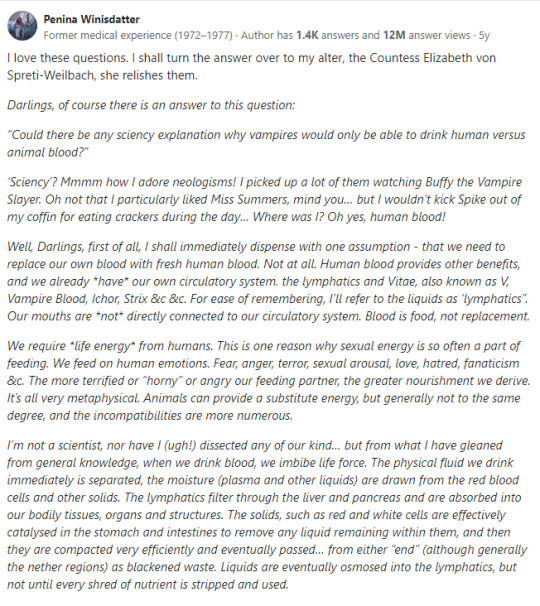

LORE'S OVER, HERE'S THE FUN PART!
I have questions. SO many questions. Even if it's stupid, I want to hear your answers!
ARE VAMPIRE SPAWN IMMORTAL? IF NOT, HOW LONG DO THEY LIVE FOR? A: Idfk, I assume immortal, but literally nothing confirms whether this is the case. Either way it's A Very Long Time.
CAN VAMPIRE SPAWN EAT & DRINK? IS IT A TADPOLE THING? Honestly this could go either way for me. I do like the VtM interpretation of not being able to keep it down for long if they do.
HOW DOES THE BODY WORK? DIGESTIVE SYSTEM? CIRCULATORY SYSTEM? Idk tbh. Please help. (Though I do like the non-regenerative fluids idea.)
BODY TEMPERATURE? I agree he runs cooler than normal body temperature and is probably That Asshole With The Cold Feet in bed but I also saw this cute af headcanon of him of him being cold-blooded like a lizard. So self-regulating body temperature by sun-bathing and such and I can't stop thinking about it.
OTHER QUESTIONS I FORGOT?
THANK YOU FOR READING THIS NONSENSE!!
#bg3#dnd 5e#vampire spawn#vampire#astarion#bg3 astarion#astarion ancunin#please help me i'm begging you idk what to headcanon/lore anymore it's so har d#maybe as a hive mind we can make it make sense#maybe i'll make polls out of the most popular answers if this gets enough engagement
34 notes
·
View notes
Text

The symbol of Khorne, formed from the flesh of daemons and mutants (Ian Miller, Realm of Chaos: Slaves to Darkness preview, White Dwarf 105, September 1988)
#Warhammer#Ian Miller#Khorne#daemons#oldhammer#Chaos#Warhammer Fantasy#Rogue Trader#40K#Warhammer 40K#White Dwarf#Games Workshop#GW
304 notes
·
View notes
Text
The Gunletter - A Warhammer 40K Story.
It’s a bloodletter, with a gun.
“Is this the right one?”
“I don’t know.”
These were the first words the bloodletter heard when he was taken from the Warp, taken away from the glorious battlegrounds of the Brass Keep. Stolen into realspace by, potentially, complete accident.
As the daemon felt his form adjust to the new reality, his sight still adjusting to a realm quieter than the realm of Chaos, he questioned why would anyone summon him on purpose.
“What do you mean you don’t know, witch?” A gruff voice roared. “What did I hire you for?”
“I never heard of this ‘Deadeye’ guy before.” A husky voice hissed back. “As long as you gave me the right true name, this should be it.”
“This is what I get for trusting a tribal witch”
“Remind me who wanted to summon a daemon.”
The bloodletter’s vision slowly adjusted to the point he could see. He was in a dark room, candles being the only source of light. Four figures stood in front of him. The summoner had skin made of turquoise scales and wore a brass horned helmet. Her tail wrapped around a blood stained staff radiating with pure psychic power. The so-called commissar wore a blood red cap and dirty black jacket, a bolt pistol on his hip and a power fist on his right arm. Behind him stood two soldiers, a male and female, garbed in blood red uniforms and black flak armor. They each carried a scoped rifle. Snipers.
“Thle’gzir’owaff. The Deadeye.” The witch hissed, speaking both the red daemon’s true name and use name. “I, Zuri no Kage, Shaman of the Oni, have summoned you to real space. You and I have been bound by Sirdar Vorghos to serve the Blood Pact’s needs.”
“Why do you demand my presence, daemon-kin?” Deadeye growled.
“I request your unique skill set in the coming battle against the Imperium of Man.” Vorghos order, struggling to save face in front of the daemon.
“Daemon-kin.” Deadeye continued, ignoring the human. His one pure black eye and one scarred, milky white eye focused on the mutant’s glowing purples. “I’ve heard of tales of your tribe venerating all neverborn as deities, kami as your kin call us.”
“That is correct, my lord.” Zuri bowed in a casual manner. Way too casual for the mortal soldiers’ comfort.
“I don’t disrespect the daemon, witch!”
“I’m not. And he’s not lying when he calls me kin.”
The three soldiers stared at her in confusion.
“I’m a master of possession.” The witch defended sheepishly.
“You smell of Slaaneth.”
“My past patron didn’t care for daemonic allegiance. The Word Bearer wanted an exalted daemon for a possession, a daemonette was the first thing that answered.”
Deadeye leaned into the mutant. “You also smell of blood. Gore mage?”
“I dabble.” She awkwardly giggled, breaking eye contact.
A claw was placed into the witch’s white hair, her tail happily waggin in response. “Our tools of war are rare, oft forgotten by our kin.” The daemon turned to the commander. “Why do you demand my presence, Sirdar Vorghos of the Blood Pact, formerly commissar of the Maccabian Janissaries?”
The former commissar instinctively reached for the bolt pistol on his hip.
The daemon’s scarred eye glanced towards the sniper team behind them. “Khuzri. Skor. How did one of the Anathema’s finest come to be the leader of a regiment of Kharneth’s mortal warriors?”
The split second the daemon glared at them, the sniper and the spotter dropped to their knees. “We only wish to serve!” The two yelled simultaneously.
“I don’t need slaves!” Deadeye roared back. “I need warriors! Are you two warriors?”
“W-We’re snipers m’lord.” The spotter, Skor, struggled to answer.
Deadeye steadied his arms. In each palm, burning smoke began to form. A metal bar appeared between his claws, slowly stretching into a longer form. After a few seconds, a brass musket sat comfortably in his arms. “Are you two warriors?”
Khuzri spoke up. “We have a combined twenty four kills under our belts.”
“Twenty four officers, generals, and warlords slain by our hands.” Skor added.
“Good... And how many more skulls will be added to our tallies today?”
“This moon, Kage as the locals call it, is one of eight moons that orbit the gas giant dubbed Amaterasu, which is one of eight planets in the Izanagi System, all of which sits under the thumb of the Blood Pact.” Vorghos sighed. “However, a rogue trader’s fleet has recently appeared in the system. While, thankfully, they haven’t realized who is truly in charge of this realm yet, we would like to eliminate this threat before they do. This requires us to strike in such a way so that both completely eliminates the fleet and quick enough that they can’t send a distress message back to the Imperium.”
“The shamans predict that the trader herself will be landing on my home in half a cycle.” Zuri interrupted.
“And this is where I step in.” Deadeye grunted.
“Yes, you and my snipers will take out the trader and her inner circle, and the fleet will strike during the confusion.”
“Where are they landing?”
---------------------------------------------------------------------------------------------
Local Time: 02:00 AM
Khuzri and Skor sat in silence on a small grassy hill, a pair of rifles pointed at an open field below them. Their ghillie suits mixed with the natural twilight of a gas giant partially obscuring the sun had made them practically invisible to the eye. And given that Kage is a feral world, the landing party wouldn’t go out of their way to search the landing sight for hostiles. To them, any expected threat is a feral tribal with a sharp stick.
A giant, metal bird roared through the sky. The thunderhawk transport was designed to carry tanks into battle. The rogue trader was using it to make landfall on a feral moon.
The snipers aimed their rifles. The shamans claimed that the kill shot will be three clicks away. Wind speed was eighteen knots. The two saw a red glint a few clicks away. The daemon was also adjusting its shot.
The thunderhawk kicked up a small cloud of dirt as it landed. Only more dust was kicked up as a Leman Russ battle tank rolled out of the transport. A squad of twenty guardsmen followed out, Vostroyan Firstborn by the look of their big hats and red jackets, creating a pseudo parade formation. A parade for, as far as they knew, only the trader sitting on top of the tank.
The titular rogue trader was donned in black power armor that emphasized her physical features to a ridiculous degree. Khuzri stifled a chuckle as she noticed how the suit of power armor enhanced some “features.” Her scope returned to her target, as the showboat wasn’t her prey. Instead Khuzri glared at the last man out of the bird, a robed man carrying a large staff. Somesort of preacher she thought, but the tubes connecting to his head were common amongst sanctioned psykers. Either way, a worthy target.
Skor focused his aim on a guardsmen equipped with a chainsword. The sergeant led the squad in this mock parade, belting orders that neither sniper could make out. While his black helmet and bulky uniform covered what this man actually looked like, Skor knew all the signs of a competent officer.
Once everyone was out, the thunderhawk took to the air. Three seconds passed, the transport disappeared to the sky as the convoy paraded to Khorne knows where. Three triggers were pulled. Three deafening cracks faded into one. The first to fall was the staff carrying man. A hole formed in his chest as a mix of blood, bone, and blue psychic energy filled the air. The second to fall was the sergeant. Being at the front of this convoy, he collapsed forward into the red mist that formed, blood pooling from his neck wound. The last to fall was the trader herself, screaming profanities as she tumbled off the tank.
Unlike her psyker and sergeant, the trader wasn’t shot, and the only wound she suffered was a small cut and a concussion that formed when her unarmored head struck the side of the Leman Russ. Instead, a molten metal bullet bored through the hull of the tank, and the trader was jolted off the cannon when the tank suddenly braked.
The three snipers adjusted their aim, and three more shots rang out. Two more guards fell and a second hole formed in the tank. Thirteen of the squad ducking behind cover of the tank as the four remaining guards helped the trader up.
“Ready?” Skor asked over the vox.
Deadeye’s channel was silent. While he physically had a vox, granted to him by Zuri, he hasn’t been using it to communicate.
“Now…”
Khuzri and Skor followed the silent order that echoed in their minds.
The side of the damaged tank was painted red in gore. Two Vostroyans collapsed to the ground, two bleeding wounds where their hearts used to be. The third bullet, the daemonic bullet, found its target not in a guardsman or the tank hull.
The rogue trader glanced down. Her black armor glowed a molten brass, the sludge slowly melting skin and metal alike. A final breath escaped her lips as her ribs, lungs, and heart liquified. The last thought going through her mind was less of a scream of pain and more a question. “This doesn’t hurt. Why doesn’t this hurt?”
The noble woman, destined to bring glory to her house and the God-Emperor, slumped over dead on a backwater moon, blindly walking into an ambush that doomed her entire fleet.
“Fifteen left…” Deadeye growled, quickly loading another round in the chamber. Skor has claimed three skulls. So has Khuzri. He had only taken two, having spent a round to take out the Leman Russ’s engine. He lined up the shot, slaying another guard and piercing a hole into the hull. “Fourteen. Four skulls.”
The two mortals, not wishing to appear to be failures in front of the daemon, both seemed to claim the last soldier not in cover. Skor was quicker on the draw, tying his kill count while Khuzri spent the first missed round.
“Frak.” She cursed, firing another round at a head poking around the side of the tank. It grazed their armor. “Frak!”
“Impatient.”
Skor, in contrast to his partner, was silent, calculating, focused. So focused on the left side of the tank that he failed to notice the sniper peak out on the right side. A dirt cloud kicked up by the bullet filled the air, alongside a string of curses from the blinded mortals.
“Unaware.”
The guard sniper lined up a shot again. Deadeye counter sniped, sacrificing a skull for a guaranteed kill.
“Mortals, hold your fire till you have the killing shot, but do not zone in on your target. Keep an eye open for threats. Be patient, and be aware.”
Khuzri and Skor realigned their sights as the dirt cloud faded away.
“Thirteen left. Don’t worry about who can kill the most, just focus on the mission.”
The two mortals took a deep breath. “Ready.”
Most of the firstborn charged out, a volley of red lasrounds covering the three guards trying to get into the tank.
Without speaking, the three focused their aim on the three climbing on the tank. Three kills.
“Relocate.”
Khuzi and Skor split off, running to new positions. The remainder of the squad split to follow them.
As the mortals were distracted, Deadeye took position at where the two snipers were set up. Two more guards were killed before they realized what happened.
This distraction allowed the mortal snipers to go prone and readied their rifles.
Khuzi fired first, followed by Skor, and Deadeye. Another volley followed, and three more were slain.
“Two left.”
The last two guards ducked back behind the tank.
“What’s the call?” Khuzi asked over the vox chat.
The daemon’s growl echoed through the mortals' minds. “Each of you pick one and decide what to do with them.” Once he was done, his rifle vanished, he stood up, and walked away.
“Where are you going?” Skor asked.
“My pact is almost complete. I no longer need to be here any more.”
---------------------------------------------------------------------------------------------
“Tea should be done in a few.”
Deadeye didn’t reply, the daemon was too busy looking around the room. He was kneeling on a soft cushion, a small table with a plate of onigiri placed right in front of him. Zuri placed a kettle on a wood-burning stove. The hut was well furnished, clean, a place that doesn’t look like a place a blood witch would own.
“I’m surprised you aren’t joining the Blood Pact in attacking the fleet.” The teal mutant said.
“I can ask you the same.”
“Didn’t seem like a good fight.” Zuri’s voice was partially drowned out by the screeching kettle.
“Are you sure it’s not because of the spawn of the twentieth already on board?”
Zuri’s face dropped. “What?”
Deadeye gave the closest thing to a smile he could give. “Forty years ago your mother summoned me into real-space so I can get shoved head first into a teal hound-shaped box.”
“S-sorry…”
“Don’t apologize, I’m hunting her down, not you, Theta von Hellebor.”
“Zuri. It’s Zuri. My mom is the granddaughter of a Kage tribal smitten by a knight freeblade. My mom is the noble woman prosecuted for her mutations. My mom is the one to become the pet project of an Alpha Legionnaire with too much time on his hands and became his master of executions and his soul link. My mom is the one to sabetouge records so that this system no longer existed to the Imperium. My mom is the one who conquered the shoguns and claimed the green gas giant overhead and its satellites as hers. My mom is the von Hellebor. I’m just Zuri, the local witch who lives in a hut in the woods.”
“Zuri.” Deadeye growled softly. “You and I are the same.”
“Liking guns more than your other daemons isn’t the same as trying to live up to a proper lord.” She sighed. “You have no idea how I feel.”
“I… I…” Deadeye struggled to speak. “I… don’t know. I don’t know how you feel. I am a tool made for war and murder, I do not have parental figures to match up to. I guess Khorne would be a parent of sorts and… I don’t know if he’s proud of me.”
“I’m sure he is.”
“Why would he be?” Deadeye sighed. “I’m not honorable and I don’t kill nearly as many as my kin.”
“Because Khorne isn’t just the god of honor and murder.” Zuri gave the daemon a fang filled smile. “He's also the god of war.”
“So?”
“While the legions of berserkers and beast riders fight the wars, they don’t win them. It’s the strategists that win them. So one willing to put aside personal glory to win. And you, my bloody brother, are the one to win wars.”
“T-Thank you.” Deadeye grinned. “But I have to ask, are you really working with the Blood Pact? Was this a plan to kill your mother, or are you handing her and her astarte handlers new playthings?”
Zuri giggled, pouring the kettle of tea into two cups. “My answer will depend on who wins the coming fight.”
“You are a snake.”
“Says the sniper.”
#warhammer#warhammer 40k#warhammer 40000#short story#chaos 40k#warhammer oc#warhammer fanfic#warhammer chaos#warhammer daemon#chaos daemons#40k#wh 40k#wh fandom#40k daemon#khorne
8 notes
·
View notes
Text










Realm of Chaos: The Lost and the Damned (1990) is the second, much delayed companion to Slaves to Darkness. It takes the same overstuffed, gruesomely illustrated approach to the two remaining ruinous powers of Chaos: Nurgle and Tzeentch. That thoroughly horrific cover is by Les Edwards, because of course it is. You might think the roster of interior artists slightly diminished thanks to the lack of work by Russ Nicholson and Ian Miller. That is not the case. While I do miss their distinctive styles and what they could have lent to the book, I think this volume is more visually impressive on the whole, a really overwhelmingly grim achievement.
A couple things of interest here beyond the awesome art and the details on the two more interesting Powers (if you didn’t know, this is the definitive, objective ranking: the best is Tzeentch, followed by Nurgle, then Slaanesh, then that ding-dong edgelord Khorn). First is in-universe. I think it is actually no longer the case, but at this point in time, the ruinous powers were thought constructs assembled out of the residual desires of human souls that pass through Chaos; this lends them a surprising complexity. They are entities made up of extremes, dominated by negative impulses, but with positives shining through occasionally, like the way Nurgle comes off as caring, or Khorne honorable, or Tzeentch inquisitive. It makes the allure of Chaos, so often characterized by horror and mutation, somewhat more understandable.
Second, these are recent reprints of the books, available only at Warhammer World in Nottingham. I had originals at one point, but honestly the binding are so fragile (and they command such steep prices) that it made much more sense to have a friend in Nottingham pick up a set and mail them to me (many thanks, Ruth!). If you want these books, I highly suggest making your own Nottingham friends.
#roleplaying game#tabletop rpg#dungeons & dragons#rpg#ttrpg#d&d#Warhammer#Realm of Chaos#Games Workshop#Lost and the Damned
200 notes
·
View notes